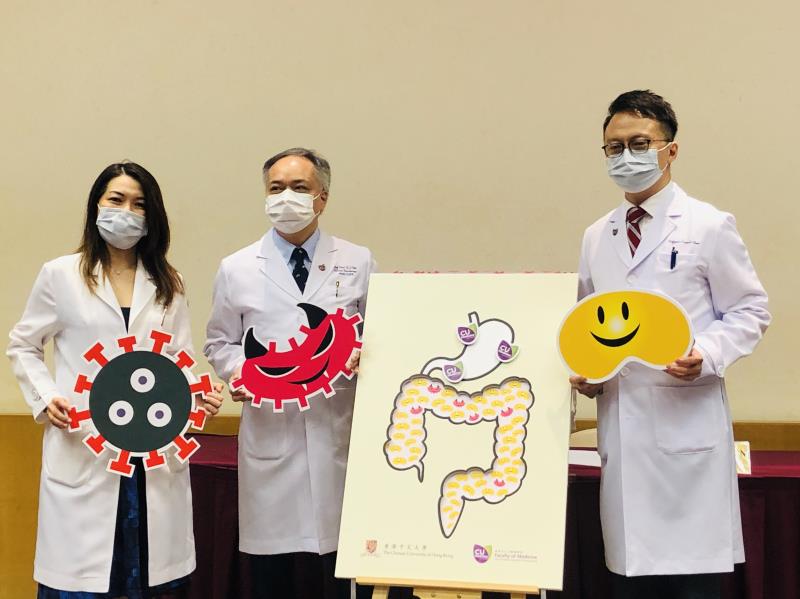Gut dysbiosis in COVID-19 prompts development of probiotic supplement




 From left: Prof Siew Ng, Prof Paul Chan, Prof Francis Chan
From left: Prof Siew Ng, Prof Paul Chan, Prof Francis ChanPatients with coronavirus disease 2019 (COVID-19) have significant gut dysbiosis that persists even after viral clearance and resolution of respiratory symptoms, according to a metagenomic study by the Chinese University of Hong Kong (CUHK). These findings have led to the development of a probiotic supplement expected to be available in a few months.
“Our study is the first in the world to show severe gut dysbiosis in COVID-19 patients,” said Professor Paul Chan of the Department of Microbiology, CUHK. “These significant alterations in faecal microbiome persisted even after the patients had been discharged from hospital.”
In the shotgun metagenomic sequencing analysis, the researchers compared the microbiome composition of faecal samples from 15 patients with mild to critical COVID-19, collected 2–3 times per week from the time of hospitalization until discharge, with faecal samples from 15 healthy individuals. [Gastroenterology 2020, doi: 10.1053/j.gastro.2020.05.048]
Compared with controls, patients with COVID-19 had significant alterations in faecal microbiome, characterized by enrichment of opportunistic pathogens and depletion of beneficial commensals, at the time of and at all time points during hospitalization.
“The depleted symbionts and gut dysbiosis persisted even after clearance of the severe acute respiratory syndrome coronavirus 2 [SARS-CoV-2] and resolution of respiratory symptoms,” the researchers reported.
In addition, baseline abundance of Coprobacillus, Clostridium ramosum, and Clostridium hathewayi was correlated with COVID-19 severity, while an inverse correlation was found between the abundance of Faecalibacterium prausnitzii (an anti-inflammatory bacterium) and disease severity.
Over the course of hospitalization, Bacteroides dorei, Bacteroides thetaiotaomicron, Bacteroides massiliensis, and Bacteroides ovatus, which downregulate the expression of angiotensin-converting enzyme 2 (ACE2) receptor in murine gut, inversely correlated with SARS-CoV-2 load in faecal samples from patients.
“We subsequently expanded the gut microbiome analysis to 150 patients with COVID-19 and 1,500 healthy controls, and developed a probiotic formula that targets the gut dysbiosis identified,” said Professor Siew Ng of the Centre for Gut Microbiota Research, CUHK.
“Our probiotic formula is developed based on data from Chinese individuals,” Ng continued. “Patent applications have been filed in China and the US. We are currently working with innovation and technology companies and food companies to turn the probiotic formula into a dietary supplement.”
“Back in January 2020, China’s National Health Commission published a paper that included the use of probiotics in treatment of COVID-19. However, currently available probiotic products are limited by susceptibility to gastric acid, high temperatures and humidity, low quantity of live bacteria, as well as short shelf-life,” explained Professor Francis Chan, Dean of Faculty of Medicine, CUHK.
“Our probiotic supplement will be produced with microencapsulation technology to enhance the quantity of live bacteria and their stability under low gastric pH, high temperatures and aerobic conditions. The supplement is expected to be available in the next few months, to help enhance gut health and overall immunity of citizens,” he continued.
“Gut dysbiosis is already known to be associated with various conditions, including eczema, attention deficit hyperactivity disorder, diabetes and obesity. Gut microbiota can be modulated through diet and lifestyle. Results of our study provide a new perspective in the fight against COVID-19,” added Ng.
The CUHK researchers are working on large-scale clinical trials to provide further evidence on the importance of gut health for preventing novel infectious diseases.